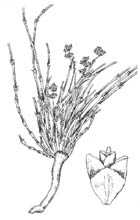
Ali and Qaiser (1987) provide a drawing.
Ephedra przewalskii
膜果麻黄 mo guo ma huang [Chinese] (Fu et al. 1999).
Syn: Ephedra kaschgarica B. Fedtschenko et Bobrov 1950, Ephedra przewalskii var. kaschgarica (B. Fedtsch. et Bobr.) C.Y. Cheng 1978 (Fu et al. 1999).
Erect or ascending shrubs to 2.4 m tall with whorled yellowish-green rigid and scabrid branches. Branchlets green to pale brownish, internodes stout, 2.5-5 cm × 2-3 mm. Leaves in whorls of 3, rarely opposite, free part triangular, apex acute or acuminate. Cones opposite or whorled at nodes, usually borne on proximal parts of branchlets, often sessile. Bracts of pollen cones in 3 or 4 whorls of 3, rarely opposite, connate at base, with broad, membranous margin surrounding central, herbaceous keel; anthers 5-8, shortly stipitate. Seed cones subglobose; bracts in 4 or 5 whorls of 3, rarely opposite, almost completely free, connate only at base, light brown and membranous at maturity, abruptly narrowed toward base, apical whorl of bracts with female flowers; integument tube 1.5-2 mm, exserted, usually straight. Seeds (2-)3, elongate-ovoid, 4-5 × 2-2.5 mm, concealed by scarious bracts. Seed 4 mm long. 2n = 14. An uncommon plant; distinguished by the broadly winged and erose bracts and yellowish-green branches (Ali and Qaiser 1987, Fu et al. 1999).
Kazakstan; Kyrgyzstan; Mongolia; Tajikistan; Uzbekistan; Pakistan (Karakoram); China: N Gansu, Nei Mongol, Ningxia, N Qinghai, Xinjiang (Ali and Qaiser 1987, Fu et al. 1999). In China it is found at 300-3800 m elevation in dry and sandy places (Fu et al. 1999).
No data as of 2023.03.03.
See the observations on iNaturalist, accessed 2021.12.30.
Ali, S.I. and M. Qaiser (eds.). 1987. Flora of Pakistan. http://www.efloras.org.
Stapf, Otto. 1889. Die Arten Der Gattung Ephedra. Akad. Wiss. Wien. Math. Naturwiss. Kl. Denkschr. 56:40. Available: Biodiversity Heritage Library, accessed 2021.12.31.
Species profile at Plants of the World Online, accessed 2021.12.30.
Last Modified 2023-03-03